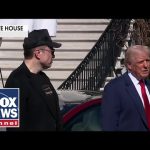President Donald Trump is once again making waves on the global stage as his administration tackles three critical issues: NATO defense spending, trade tensions at the G7 summit, and the ongoing war in Ukraine. With his characteristic assertiveness, Trump has challenged allies to step up their commitments while his team navigates delicate diplomacy in pursuit of American interests.
In Washington, Trump met with NATO Secretary-General Mark Rutte to discuss defense spending. Trump’s insistence that NATO members meet—and exceed—the 2% GDP threshold for defense spending has yielded results, with 23 of 32 member nations hitting the target last year. Rutte praised Trump’s leadership for reinvigorating the alliance and pushing European nations to boost their military budgets by $874 billion. Conservatives view this as a triumph of Trump’s America First policy, ensuring that U.S. taxpayers are no longer footing an outsized portion of NATO’s defense bill. However, Trump remains firm that even more must be done to strengthen collective security against threats like Russia and China.
Meanwhile, in Quebec, Secretary of State Marco Rubio faces a frosty reception at the G7 summit, where allies are bristling over Trump’s tariffs on steel and aluminum. Canada and the European Union have retaliated with levies on American goods, sparking fears of a trade war. Rubio has defended the tariffs as necessary to protect U.S. industries and national security, arguing that domestic production of steel and aluminum is vital for building warships and aircraft. While critics accuse Trump of alienating allies, conservatives see these measures as a bold stand against unfair trade practices that have long disadvantaged American workers.
On the Ukraine front, Trump is pursuing a potential breakthrough in the three-year war. His special envoy, Steve Witkoff, is in Moscow negotiating a 30-day ceasefire proposal with Russian officials. While Ukrainian leaders have agreed to the plan, Russian President Vladimir Putin has expressed cautious support but demanded terms favorable to Moscow. Conservatives applaud Trump’s willingness to engage directly with Putin in pursuit of peace—a stark contrast to the passive diplomacy of prior administrations. However, skeptics warn that Putin’s demands could undermine Ukraine’s sovereignty and embolden Russian aggression.
These developments underscore Trump’s unapologetic approach to foreign policy: demanding accountability from allies while refusing to shy away from tough negotiations with adversaries. His critics may decry his tactics as divisive or heavy-handed, but supporters argue that Trump is reshaping global dynamics to prioritize American strength and security. Whether it’s NATO funding, trade disputes, or conflict resolution in Ukraine, Trump is proving that bold leadership can drive progress—even if it ruffles feathers along the way.
As these talks unfold, conservatives remain optimistic about the outcomes. Strengthening NATO, protecting American industries through fair trade policies, and pursuing peace in Ukraine align with core principles of sovereignty and security. While challenges persist on all fronts, Trump’s strategies reflect a commitment to putting America first—an approach that resonates deeply with his base and underscores his vision for a stronger nation on the global stage.




